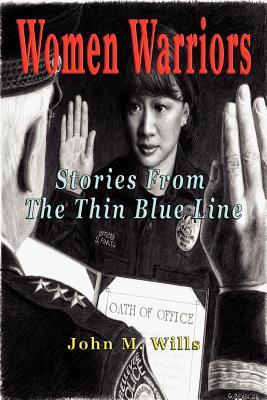
-- Alan Jacobson, National Bestselling Author of Inmate 1577 "Wills shines a light on the courage and tenacity of the profession's female Warriors."
-- Dave "Buck Savage" Smith, Internationally renowned police trainer "A rare glimpse into the lives of women in law enforcement."
-- Noah Boyd, NYT best-selling author of The Bricklayer A powerful, deeply moving book. Filled with tales of courage, sacrifice and steely warrior determination. Powerful proof that the warrior spirit knows no gender!
-- Dave Grossman, Lt. Col. USA (ret.) Author of On Combat and On Killing "Often dismissed is the true warrior role so many women play in law enforcement. Wills brings that role into sharp focus."
-- Frank Borelli, Editor, Officer.com "John's book reminds us there are women in this profession taking their turn 'Walking the Point.'"
-- Terry G. Hillard, Retired Superintendent Chicago Police Department Q: What led you to pursue a career in law enforcement?
A: I thought about it a great deal while I was serving in the Army. After I got out, I took the test and was subsequently called for training. I liked the idea of police work because it was a challenge, and it was exciting. Frankly, I couldn't imagine working in an office from 9 - 5 every day. Q: What types of crimes did you investigate as an agent?
A: Mostly violent crimes-narcotics, outlaw motorcycle gangs, organized crime. I worked several undercover assignments, dealing with drugs and public corruption. I became a member of the SWAT team and was a sniper. I served as the principle firearms instructor in the Detroit Division for a while. While assigned to the FBI Academy at Quantico, Virginia, I served as an instructor in tactics, physical training, and street survival. Q: In your many years in law enforcement, what insights do you have into the criminal mind that you've used in your novels?
A: Having interviewed hundreds of suspects, I have a fairly good idea of where they were coming from, their mindset and mentality, I was able to understand their rationale for committing crimes, and thus give them the impression that I was sympathetic to their cause. That approach often allowed me to create a bond that caused them to divulge information about their crime. Understanding what goes through the minds of criminals allowed me to develop informants, who are often the key to solving a crime.
-- Alan Jacobson, National Bestselling Author of Inmate 1577 "Wills shines a light on the courage and tenacity of the profession's female Warriors."
-- Dave "Buck Savage" Smith, Internationally renowned police trainer "A rare glimpse into the lives of women in law enforcement."
-- Noah Boyd, NYT best-selling author of The Bricklayer A powerful, deeply moving book. Filled with tales of courage, sacrifice and steely warrior determination. Powerful proof that the warrior spirit knows no gender!
-- Dave Grossman, Lt. Col. USA (ret.) Author of On Combat and On Killing "Often dismissed is the true warrior role so many women play in law enforcement. Wills brings that role into sharp focus."
-- Frank Borelli, Editor, Officer.com "John's book reminds us there are women in this profession taking their turn 'Walking the Point.'"
-- Terry G. Hillard, Retired Superintendent Chicago Police Department Q: What led you to pursue a career in law enforcement?
A: I thought about it a great deal while I was serving in the Army. After I got out, I took the test and was subsequently called for training. I liked the idea of police work because it was a challenge, and it was exciting. Frankly, I couldn't imagine working in an office from 9 - 5 every day. Q: What types of crimes did you investigate as an agent?
A: Mostly violent crimes-narcotics, outlaw motorcycle gangs, organized crime. I worked several undercover assignments, dealing with drugs and public corruption. I became a member of the SWAT team and was a sniper. I served as the principle firearms instructor in the Detroit Division for a while. While assigned to the FBI Academy at Quantico, Virginia, I served as an instructor in tactics, physical training, and street survival. Q: In your many years in law enforcement, what insights do you have into the criminal mind that you've used in your novels?
A: Having interviewed hundreds of suspects, I have a fairly good idea of where they were coming from, their mindset and mentality, I was able to understand their rationale for committing crimes, and thus give them the impression that I was sympathetic to their cause. That approach often allowed me to create a bond that caused them to divulge information about their crime. Understanding what goes through the minds of criminals allowed me to develop informants, who are often the key to solving a crime.
Paperback
$17.95